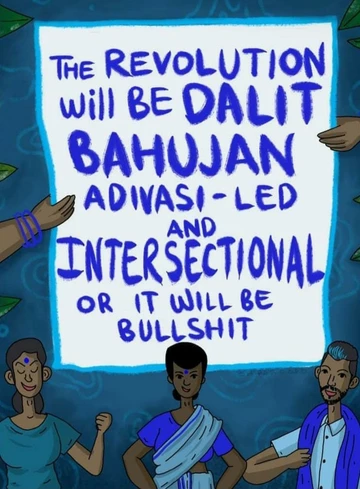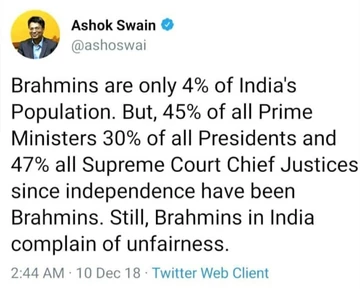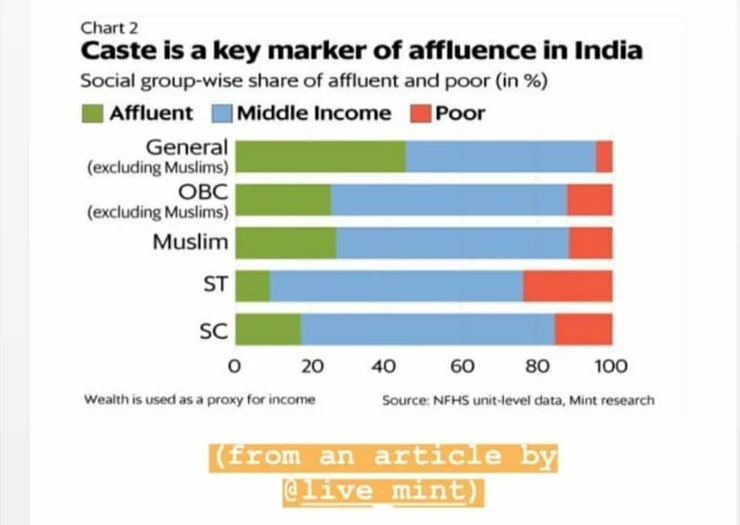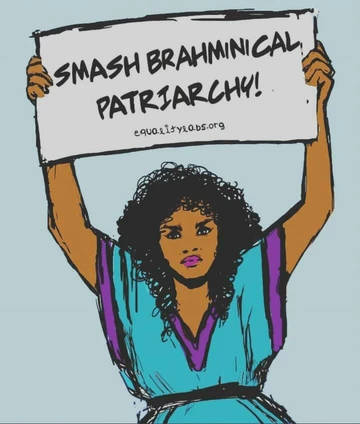Savarna feminism: understanding & acknowledging privilege by Chinmayee Kuber
I will start by apologizing to Dalit, Bahujan, and Adivasi feminists who have voiced their opinions time and again but always been spoken over by privileged people. I am sorry. I will try to do better.
“ Savarna feminism” refers to the feminist movement led primarily by upper caste, class Hindu womxn*. It is similar to white feminism in the USA. It completely neglects the role played by caste in a womxn’s life. It is key to understand that oppression is not binary. By that I mean even though you may be oppressed by patriarchy, you may still be privileged in terms of caste and class. There are a number of privileges like caste privilege, gender privilege, class privilege, male privilege etc. Having one or more privilege as such, is not wrong, because most of the time you are born with it. Not acknowledging it and not calling out people from your privileged space, is the problem.

It is obvious, one must speak out in the face of oppression, but, how you speak out is equally important. Never speak for the marginalized and definitely not over them. Amplify the marginalized voices. Pass the goddamn mic. Remember, the marginalized womxn aren’t “voiceless”. They always had a voice which privileged people refused to listen to, thus wrongly claiming them to be voiceless.
Here are some things I have heard Savarna Feminists say, and why it’s problematic:
“Economic and reservations for women are okay, no need for caste-based reservations”

Caste based reservations are for social upliftment. Also, there are reservations for economically weaker sections. Nearly half of the general category individuals belong to the affluent category and only 4% belong to the poor category. At the other end of the social pyramid, only 9% tribal belong to the affluent category, more than a quarter are poor. Dalits or scheduled castes account for second highest proportion of poor (data from an article by Live mint). Thus, saying Dalits are rich now is baseless. The poverty prevailing in dalits, bahujans and adivasi people is the result of the caste system. Caste system is the cause and poverty is the effect. The solution should try to eliminate the cause. It’s like, we savarnas, get a head start and the caste-based reservations only somewhat try to level the playing field, socially. Reservations are not the permanent solution to eliminating the caste system, they’re only a part of it. I know its uncomfortable when our privilege is challenged and it’s against what we’ve been conditioned to think all our life. But if you call yourself a feminist its important to step out of your bubble of personal experiences and listen to marginalized womxn.

This is called tokenism, where you use that one marginalized friend you have to make yourself look inclusive or “woke”. If you have DBA, trans friends just to make yourself look inclusive, to make a point about yourself, to fit into the feminist movement, then sorry, but you aren’t an ally. Don’t use marginalized people’s identities as excuses to look woke.
“But I read… (goes on to explain some theory on the internet about marginalized lives)”When having a discussion with a person from an oppressed group, refrain from saying this. Their lived experiences are greater than something you read on the internet. It’s that simple.
“But I identify as an atheist”So? You always have the caste privilege to fall back on. You still cannot absolve yourself of your caste privilege.
“I don’t see caste, so caste doesn’t exist”Yes, you may not see caste but casteism in general is systemic oppression more than individual. As long as the upper castes benefit from casteism at the systemic level, caste will be there.
“She can’t debate without getting angry/ she doesn’t speak English properly”This is tone policing and elitism respectively. Tone policing is when a person’s comment or opinion is disregarded or dismissed solely based on the emotions or tone, completely ignoring the point they were trying to make. Telling marginalized people to “calm down”, “not get worked up”, “not be rude all the time” come under tone policing. Tone policing is a silencing tactic for the marginalized. It is based on the idea that emotion and reason cannot exist together, which is false. Therefore, in a debate one should focus on the point the person is trying to make rather than the way they make it in. also avoid correcting the English of a less privileged person, instead focus on the point they’re trying to make.
Casteism may not seem like a big deal to you, but it affects marginalized lives, drastically
Institutional casteism has cost lives. The case of Dr Payal Tadvi and many others like her is truly disheartening. Dr Payal Tadvi, a resident doctor at a hospital in Mumbai, who was forced to commit suicide due to caste based institutional harassment and bullying by three upper caste senior doctors, merely for being an Adivasi womxn from the bhil Muslim community and for getting admission in the course through reserved quota. So yes, casteism is still prevalent in urban cities and can be fatal.
Some revolutionary Bahujan womxn all feminists can learn from;
1. Savitribai Phule:
In 1848, Savitribai started India’s first school for womxn along with her husband Jyoti Rao Phule and Sagunabai in Bhhidewada. Both Jyotiba and Savitribai Phule were thrown out of their house due to mounting pressure by Brahmins. In 1849, she met Fatima Sheikh and they started a school for backward caste communities and Dalits. In 1852, Savitribai started Mahila Seva Mandal and held a historic barber strike against the practice of shaving widows’ heads. In 1853, she started a Home for Prevention of Infanticides in her house for pregnant Brahmin widows. In 1897, she opened a clinic for plague with her adopted son Yashwant. In the same year while trying to save the son of Pandurang gaikwad in mahar settlement, who was afflicted with the plague, she herself caught the disease and on 10th March, 1897, she passed away. In more than one way, Savitribai has contributed to the education of girls in India.
2. Mukta Salve:
Mukta Salve was one of the first Dalits to openly question and criticise the discriminatory caste and gender norms of the Indian society in the 19th century. In 1855, she wrote ‘Mang Maharanchya Dukhavisatha (About the Grief of Mahar and Mangs)’ at the mere age of fourteen. This scathing article, translated and published several times, would later become one of the first works of Dalit literature. (taken from FII)
3. Tarabai Shinde:
Tarabai Shinde was a feminist activist who protested patriarchy and caste in 19th century, in India. She is known for her published work, Stripurush Tulana (“A Comparison Between Women and Men”), originally published in Marathi in 1882. The pamphlet is a critique of upper-caste patriarchy, and is often considered the first modern Indian feminist text.
4. Chakali Ailamma:
She was an Indian revolutionary leader who fought the upper caste feudal landlords for her land. She has inspired many womxn to fight for their land and dignity.
Now what exactly can you, as an upper caste womxn do?
Listen!!! learn and unlearn!
Listen to talks by Bahujan, Dalit and Adivasi womxn. Listen to their lived experiences. When they tell you something you’ve said or done is problematic, instead of being hurt and angry, try to improve.
Support DBA womxn artists and entrepreneurs.
If you can, buy art made by Dalit womxn. Support businesses like paalaguttapalle bags, which is run by Dalit womxn, in Andhra to sustain their families through drought. If you have the money, please donate to local businesses by womxn.
Read!!!
Annihilation of caste by Ambedkar is a must read for savarnas. I have learned a lot about the caste system through his books.
And finally, educate people in the circle around you.
It is important to call out your savarna feminist friends and help them learn and unlearn. I know its difficult to let go of the things we have heard since childhood, but doing this is the least we could do.
At the end, it is still important to note that men, as a whole, are privileged over womxn. Caste is one of the other factors, as discussed here. I could go on and on to talk about patriarchy and the immense number of privileges men have in our society. Men have always been chosen first for bigger posts, even though there may be equally or more capable womxn. The gender wage gap, is prevalent in most places, where men are paid much more than womxn. There are a million examples to give as to how patriarchy and misogyny thrive, and how womxn from all sections of lives continue to be affected by it. So to any man reading this, instead of complaining about how feminism is “unfair” , it’s best if you could acknowledge your privilege, listen when womxn talk and stop mansplaining everything. Call out your “bros” for their misogynistic behaviour. It is not enough to not just be sexist yourself. It is important to realise how you benefit from the status quo in the society, in ways you may not know of. Thus, if you are not working to dismantle sexism, misogyny and patriarchy, you are in more ways than one, supporting it.
I have learned and unlearned a lot from social media:
Accounts on Instagram:
@anticastecat
@dalitfeminist
@humans_of_patriarchy
(* in this article I’ve used the word womxn instead of women because it’s a more inclusive term that includes trans women, non-binary people, gender fluid people and gender non-conforming people)
Jai Bhim. Jai Savitri.






